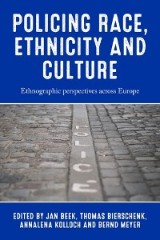Details

Policing race, ethnicity and culture
Ethnographic perspectives across Europe|
144,99 € |
|
| Verlag: | Manchester University Press |
| Format: | EPUB |
| Veröffentl.: | 28.03.2023 |
| ISBN/EAN: | 9781526165572 |
| Sprache: | englisch |
| Anzahl Seiten: | 352 |
DRM-geschütztes eBook, Sie benötigen z.B. Adobe Digital Editions und eine Adobe ID zum Lesen.
Beschreibungen
How to deal with differences based on culture, ethnicity and race, has become a key issue of policing. This edited collected explores everyday, often mundane interactions between police officers and migrantised actors in European countries and asks how both sides deal with perceived differences. The contributions reflect that such differences are not just ‘out there’ but are being situationally (re-)produced in police-citizen encounters. By taking a comparative approach, the book develops a distinctly European perspective on these questions. The book contains 12 ethnographies from ten European countries, based on new and often innovative empirical research, two theoretical contributions, an introduction and a postface.
The book explores interactions between police officers and citizens in European countries, asking how differences such as race, culture and ethnicity are brought up and in what way they shape these encounters.
<p><b>Introduction</b><br> <b>Policing differences: perspectives from Europe</b> – Jan Beek, Thomas Bierschenk and Annalena Kolloch <br><br><b>Part I: Categorizations of difference in police work </b><br><br>1 Police racism in France and Germany: occupational socialisation and institutional guidelines – Jérémie Gauthier and Jacques de Maillard<br>2 Policing order: ethnicity in statistics and the functions of nationalism – Rebecca Pates<br>3 Predictively policed: the Dutch CAS case and its forerunners – Paul Mutsaers and Tom van Nuenen <br>4 The social construction of parallel society in Swedish police documents – Ida Nafstad<br><br><b>Part II: Doing differences in everyday policing</b><br>5 Dirty Harry gone global? On globalising policing and punitive impotence – David Sausdal <br>6 Instrumentalising racism in Russian policing: everyday interactions between police officers and migrants – Ekaterina Khodzhaeva <br>7 Negotiating with ethnic diversity: perceptions and patterns in everyday police work in Germany – Nina Müller <br>8 ‘Do you understand? Yes, you understand.’: bureaucratic translations of difference during deportation talks in Switzerland – Lisa Marie Borrelli<br><br><b>Part III: Policing as translation </b><br>9 Inclusive and non-inclusive modes of communication in multilingual operational police training – Annalena Kolloch and Bernd Meyer <br>10 Talking with hands and feet: language differences and translation in German policing – Jan Beek and Marcel Müller <br>11 The Portuguese police and colonial legacies: when language divides – Susana Durão<br><br><b>Part IV: Police officers and ethnographers </b><br>12 Albanian culture and major crime: challenging culturalist assumptions among investigating UK police – Stephanie Schwandner-Sievers<br>13 Approaching foreign milieus: experiences from a joint seminar with police trainees and anthropology students – Gisela Pauli Caldas and Thomas Widlok <br><br><b>Postface</b><br><b>Authorizing race: on police reproduction of difference </b>– Ian Loader</p>
<p>Jan Beek is the leader of the research project ‘Police-translations’ in the Department of Anthropology and African Studies at the Johannes Gutenberg University Mainz<br>Thomas Bierschenk is Professor Emeritus of Anthropology at the Johannes Gutenberg University Mainz<br>Annalena Kolloch is a postdoctoral researcher in the Department of Anthropology and African Studies at the Johannes Gutenberg University Mainz<br>Bernd Meyer is Professor for Intercultural Communication at the Johannes Gutenberg University Mainz</p>
<p>How the police deal with difference – in terms of race, ethnicity or culture – has become a key issue for policing. Public discourse is dominated by shocking news events, many of them in the US, but also in Europe. The book investigates everyday interactions between police officers and citizens, often those labelled as ‘migrants’, asking how such differences are brought up and in what way they shape these encounters – with findings that do not fit neatly into the highly polarised contemporary public discourse.<br><br>Taking an ethnographic approach, contributors to this volume study the perspectives and rationalities of both police officers and migrantised citizens, with a keen awareness of the asymmetries of power and knowledge. This entails exploring the practices, discourses and beliefs of actors with whom social scientists do not always easily sympathise: police officers. Such a positioning, while often ethically challenging, is unavoidable for a nuanced understanding of policing.<br><br>Public discourse and scholarly work on policing have frequently been dominated by news and events from the US. The detailed ethnographic descriptions in this volume highlight how police practices and the practices of othering vary widely, even within Europe, and that the unique trajectories of modern US history may not provide a productive framework to understand the policing of differences elsewhere. By studying these questions in ten European countries, each with a particular history of policing and othering, the book contributes to the development of a comparative and distinctly European perspective on policing.</p>
Diese Produkte könnten Sie auch interessieren:

Pädagogik als Sorge?

von: Anna Hartmann, Jeannette Windheuser, Daniela Reimer, Sabine Andresen, Barbara Friebertshäuser, Mai-Anh Boger, Vivian Buchholz, Sina Kleinitzke, Sabine Hattinger-Allende, Barbara Rendtorff, Cornelie Dietrich, Barbara Thiessen, Denise Bergold-Caldwell, Karen Geipel, Johanna Pangritz

35,99 €















